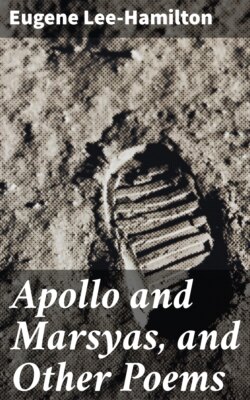Читать книгу Apollo and Marsyas, and Other Poems - Eugene Lee-Hamilton - Страница 3
На сайте Литреса книга снята с продажи.
INTRODUCTION.
ОглавлениеTable of Contents
The contest of the Satyr with the God,
Oh who shall end it? Who shall end the strife
That fills all Art, all Nature and all Life,
And give the right of flaying with a nod?
Oh who when radiant noontide’s last note dies,
And darkness with its mystery draws near,
Shall bid the strains of twilight not arise
That fill the soul with wistfulness or fear?
Man gives his love in turn, he knows not why,
To sun or gloom according to his mood;
His ear, his heart, alternately is woo’d
By Nature’s carol or by Nature’s sigh.
And Marsyas’ reed-pipe and Apollo’s lyre
Make endless competition upon earth,
As men prefer the charm of vague desire,
Or charm of bright serenity and mirth.
But not alone the wistful strains of eve
Mean unseen Marsyas speaking to the heart;
Nor is he near, in Nature and in Art,
Alone where yearning makes the bosom heave.
Often in tones more passionate he wails,
Pensive no more but fiercely wild and shrill,
And fills the soul with rapture as it quails,
And charms us with the very fear of ill.
Wherever lonely Nature claims her right
Upon man’s love, and her wild fitful voice
With flute-like wailings makes his ear rejoice
In the wild music of a stormy night;
Wherever haunting Fancy fills the gloom
With ghostly sounds, with evil spirits’ sobs,
And exiled souls seem to bewail their doom,
And, half seduced, the heart with vague fear throbs;
Wherever Poetry with magic word
Lets Passion’s loosened elements fly free,
And hiss and thunder like a storm-churned sea,
And rave and howl—there Marsyas’ note is heard.
Oh, I have felt his music in my soul
Outwail the wailing wind when every tone
Has made my fancy, bursting all control,
Create new realms as wild as are his own,
With shapes of fear, with dread fantastic spells,
And sights more wondrous than the restless stream
Of visions in a Haschish-eater’s dream,
Where whirl and eddy countless heavens and hells.
And yet I love the light, nor am I one
Bred in the darkness of Cimmerian caves,
Who shrinks with blinking eyelids from the sun,
When with the dawn he leaps on laughing waves,
The sounds which that great Dorian God, whose glance
Kindles the blushes of the pale sea foam,
Draws from his beam-stringed lyre come thrilling home,
And make the ripples of my spirit dance.
Outside, beyond my threshold, I can hear
The hum of sun-ripe Nature’s million strings,
The song of man’s frail happiness rise clear
Above the mutability of things;
And though I think, if you but listen well,
That here, upon this many voiced earth
There be less sounds of carol and of mirth
Than sounds of sigh and moan and dirge and knell;
And though what here I offer echoes less
Apollo’s lyre than Marsyas’ reedy fife,
Whose fitful wailing in the wilderness
Sounds through the chinks and crannies of my life,
Apollo’s name is sweet, and I were loth
To let the name of Marsyas stand alone
Engraven on this book, while I can own
Allegiance to both lords and love them both.
